

Merten Group - Merten Group. Prof. Dr. Roland Zengerle — Institut für Mikrosystemtechnik – IMTEK. Publications | Activities and Memberships | Editorial Activities | Conference Chairs | Contact & Address Vita Born in 1965, Professor Roland Zengerle studied physics at the Technical University of Munich, Germany.
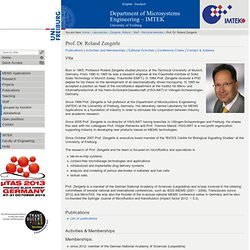
From 1990 to 1995 he was a research engineer at the Fraunhofer-Institute of Solid State Technology in Munich (today: Fraunhofer EMFT). In 1994 Prof. Zengerle received a PhD degree for his thesis on the development of an electrostatically driven micropump. Since 1999 Prof. Since 2005 Prof. Since October 2007 Prof. Welcome to the Abell Group Home Page. Dr Nicole Pamme. Research theme: Chemical Process Technology3 Research groups: Analytical Science, Lab on a Chip and Micro-fluidics4 Research interests Miniaturised bioanalytical chemistryCombination of magnetism and microfluidicsHigh throughput analysis in continuous flow devicesFabrication of micro- and nanofluidic devices Research We are studying lab-on-a-chip devices for bioanalysis, chemical processing and medical diagnostics.
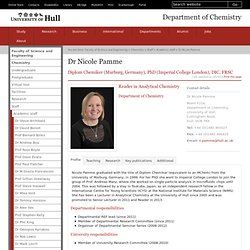
In many of our projects we explore magnetic forces in order manipulate objects such as particles or cells inside microfluidic channels. Continuous processing on magnetic particles We investigate microfluidic platforms in which magnetic particles act as mobile supports for performing surface-based (bio)reactions in continuous flow within a fraction of the time required for conventional methods. Edel Group. Delft University of Technology - Product and Process Engineering. Product and Process Engineering (PPE) views chemical engineering as an expanding field full of opportunities to create devices, processes and products.

With expertise in reaction engineering, fluid mechanics and transport phenomena, we create solutions for soft-matter, nanotechnology, energy and lab-on-chip applications, often together with chemistry, physics and life-science groups; we love interdisciplinary projects. Cees Dekker Lab. Homepage Physical-Organic Chemistry - Faculty of Science - Physical-Organic Chemistry. Microdroplets in microfluidics are an enabling technology to study compartmentalized reactions at the femtoliter, single cell, or indeed single molecule level.
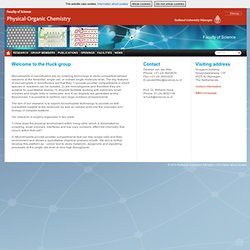
The key features of microdroplets in microfluidics are that they 1) provide picoliter compartments in which species or reactions can be isolated, 2) are monodisperse and therefore they are suitable for quantitative studies, 3) droplets facilitate working with extremely small volumes and single cells or molecules, and 4) as droplets are generated at kHz frequencies, it is possible to perform very large numbers of experiments. The aim of our research is to exploit microdroplets technology to provide us with unparalled insights at the molecular as well as cellular level into the chemistry and biology of complex systems. Our research is roughly organized in two parts: 2) Microdroplets provide picoliter compartments that can trap single cells and their environment and allows a quantitative chemical analysis of both. The BIOS Lab-on-a-chip group. Home The BIOS Lab-on-a-chip group The BIOS Lab-on-a-Chip chair (“Miniaturized systems for biomedical and environmental applications”) aims at the research and development of Lab-on-a-Chip (LOC) systems.It is our mission to: · Further the knowledge and understanding of nanofluidics and nanosensing· Bridge gap between users from physical, chemical, biomedical and life-science fields· Develop new micro- and nano-technologies for Lab on a Chip systems· Demonstrate the potential of LOC applications in biomedical applications· Transfer knowledge to companies and spin offs News 8 Apr 2014 - Bios Calendar 2014View Calendar 2014 12 Mar 2014 - Albert van den Berg becomes MIRA’s new Scientific DirectorProfessor Albert van den Berg has been announced as the new Scientific Director of MIRA, the University of Twente’s Research Institute for Biomedical Technology and Technical Medicine.
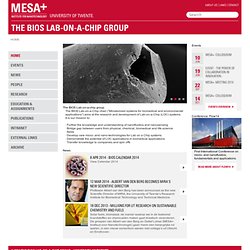
Events Events overview Conference: Flow14. ETH - Bioanalytics Group - Bioanalytics Group. ETH Zurich - Tay Group on Microfluidic Single Cell Analysis. Home. WebHome < MaerklLab < TWiki. Droplets, Membranes and Interfaces. Research / Translational Research and Microfluidics / UMRS775 / Recherche - UMRS775. Macromolecules and Microsystems in Biology and Medicine (MMBM) Keywords : lab on chips, magnetic tweezers, microfluidics, homologous recombination, chromatin, protein assays, mutation screening Read the activity report (pdf 1,7Mo, last update 19th, april 2011) MMBM is an interdisciplinary group of about 30 persons, dedicated to the application of physics and chemistry to biology and medicine.
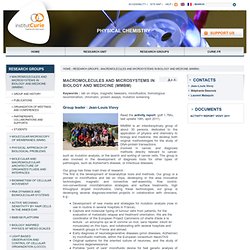
We develop both original methodologies for the study of DNA-protein transactions.involved in cancer, and diagnosis methods directly relevant to cancer, such as mutation analysis, or the search and sorting of cancer cells. The group is also involved in the development of diagnosis tools for other types of pathologies, such as Alzheimer's disease, or infectious diseases. Our group has three main lines of research :The first is the development of bioanalytical tools and methods. Laboratoire de Biochimie : Home.
IBEM. Active microfluidic chips inkjet-printed on normal paper.